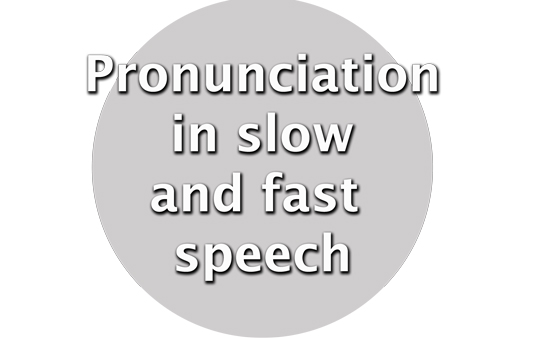ln different contexts we change the speed at which we speak.
We are likely to speak more slowly, for example, when we are talking to a large audience, or when we are talking about an unfamiliar or difficult topic .
We are likely to speak more quickly, for example, in conversation, when we are talking to friends or relatives, or when we are talking about routine or familiar topics.
Let’s look at some of the changes in pronunciation that take place in fast speech when compared with slow, careful speech. These include linking sounds, leaving out sounds and changing sounds.
Speech is broken up into units, often with a pause between them. Within these speech units, words are linked together smoothly. In fast speech in particular, these units may be quite long and the words spoken quickly. Compare the units (marked with // below) in these examples of slow and fast speech:
Slow speech: A nurse is explaining how to make a sling:
// this goes under the arm// and then over the shoulder// all the time// make sure you support the arm// talk to the patient// and find out what position// is most comfortable for them//
Fast speech: Three friends are in a Chinese restaurant:
A: // is anyone having a starter or not// or are we going straight to the main course//
B: // I’m going to go straight to the main course//
C: //yeah//
B: // but I might have an extra portion of something// you never know//
A: // do they do nice sweets here//
C: //I think it’s just lychees//
A // what’s lychees//
B: // they’re the funny little white ones// aren’t they//
C: // that’s right// I’m not terribly keen on them//
Notice how the words are run together:
// or are we going straight to the main course//
// but I might have an extra portion of something//
Because words within units are run together, it can sometimes be difficult to understand them. However, one or more word in each unit is emphasised and may be said more clearly than others. It is important to focus on these, as they usually carry the most important information in the unit.
Listen to these speech units from the restaurant conversation again and notice how the words with
syllables in large capital letters are emphasised:
//I’m going to go STRAIGHT to the MAIN course//
//I think it’s just lyCHEES//
//they’re the FUNny little WHITE ones//
// that’s RIGHT//
Here are some long speech units taken from fast speech. Listen to each and repeat.
example: What are you doing tomorrow at about half past twelve?
1. I didn’t know whether they were leaving or not.
2. She said she’d never seen anything like it before.
3. They don’t seem to be getting on too well.
4. As long as you don’t mind us coming in late.
5. We should be able to get there in a couple of hours.
First, listen to an extract from a business meeting. Then repeat six single speech units taken from the discussion. If possible, repeat them without looking at the units written out below. Try to run the words in the unit smoothly together.
(Speaker C = Canada)
A: So why did you go for Jensens// to supply the machines//
B: Well at the time// I thought they were the best available//
c: And we’ve done business with them before//
A: But that was years ago//
B: Yes// but the management hasn’t changed at all!/
c: And they’ve still got a pretty good reputation//
A: But you now feel that the product isn’t up to scratch//
B: No// they’ve been pretty poor// to be honest//
A: So you think// we ought to be looking for a different supplier//
B: Yes// I do// And for compensation from Jensens//
c: Shall I contact the lawyers about it//
A: Yes, please// We’ll leave that to you//
1 // so why did you go for Jensens//
2 // and we’ve done business with them before//
3 // and they’ve still got a pretty good reputation//
4 // that the product isn’t up to scratch//
5 // they’ve been pretty poor//
6 // shall I contact the lawyers about it//
Listen to these speech units taken from the same conversation. Identify the one word, or sometimes two words, that are emphasised in these units.
EXAMPLE // to supply the machines//
1 // but that was years ago//
2 // but the management hasn’t changed at all//
3 // to be honest//
4 // we ought to be looking for a different supplier//
5 // we’ll leave that to you//
key
1 // but that was years ago//
2 // but the management hasn’t changed at all!/
3 // to be honest//
4 // we ought to be looking for a different supplier//
5 // we’ll leave that to you//
